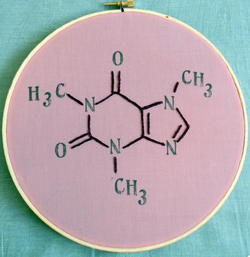
Chemical Compound Caffeine image:Spectacles
Coffee, red wine and chocolate. They’re good for you, they’re not good for you, they’re good for you, they’re not good for you. Some things I can wait for science to make its mind up on. Coffee is not one of them. I need a definitive source to ignore regarding whether my 4 heaped spoonfuls of instant cup a day is either greatly improving or just heart palpitationly bad for me.
The latest on coffee is that it’s good for you. Or bad for you, depending on your oestrogen levels and ethnicity.
The latest on coffee is that it’s good for you. Or bad for you, depending on your oestrogen levels and ethnicity.
A study at the University of Utah, published in the American Journal of Clinical Nutrition, claims to have found drinking 2 cups of coffee a day can alter levels of oestrogen in women. However, whether oestrogen is increased or decreased differs according to ethnicity.
Between 2005 and 2007 over 250 women took part in the study. Asian women who imbibed the caffeine equivalent of 2 Americanos (weak, weak, weak) boosted their oestrogen production. The same amount of caffeine for white women reduced their oestrogen levels. In black women there was little to no change in their oestrogen levels, no matter how much or little caffeine they had.
The study found that the source of caffeine was important with regard to oestrogen levels. The caffeine in fizzy drinks and green tea caused a rise in oestrogen levels in all ethnicities.
Dr Schisterman of the National Institute of Health explained why studies into hormones and caffeine were important: “Short term, these variations in oestrogen levels among different groups do not appear to have any pronounced effects. We know that variations in oestrogen level are associated with such disorders as endometriosis, osteoporosis, and endometrial, breast, and ovarian cancers.”
The participating women attended the clinic where the study took place 1 to 3 times a week for 2 menstrual cycles. It was noted by the authors of the study this provided more precise information concerning the link between caffeine and hormones and the influence of caffeine on women of childbearing age.
Kate
Between 2005 and 2007 over 250 women took part in the study. Asian women who imbibed the caffeine equivalent of 2 Americanos (weak, weak, weak) boosted their oestrogen production. The same amount of caffeine for white women reduced their oestrogen levels. In black women there was little to no change in their oestrogen levels, no matter how much or little caffeine they had.
The study found that the source of caffeine was important with regard to oestrogen levels. The caffeine in fizzy drinks and green tea caused a rise in oestrogen levels in all ethnicities.
Dr Schisterman of the National Institute of Health explained why studies into hormones and caffeine were important: “Short term, these variations in oestrogen levels among different groups do not appear to have any pronounced effects. We know that variations in oestrogen level are associated with such disorders as endometriosis, osteoporosis, and endometrial, breast, and ovarian cancers.”
The participating women attended the clinic where the study took place 1 to 3 times a week for 2 menstrual cycles. It was noted by the authors of the study this provided more precise information concerning the link between caffeine and hormones and the influence of caffeine on women of childbearing age.
Kate
 RSS Feed
RSS Feed
